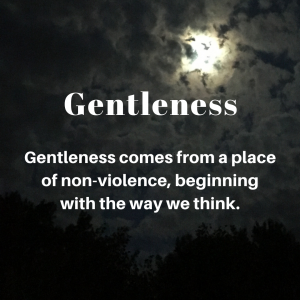
Gentleness

Description
Gentleness is an attitude of tenderness and love toward people and the world around us. Gentleness flows from a desire not to harm anyone or anything. In its presence all are safe. It takes strength to call on the self-control that gentleness requires, particularly when we feel hurt or angry. Being gentle with ourselves helps us to be more forgiving and kind to others as well. Gentleness trades control for an embrace. Gentleness is moving wisely, touching softly, speaking quietly and thinking kindly. Taking time for gentle activities nurtures our souls.
Quote
“The spiritual warrior’s discipline is gentleness. Asserting gentleness in all spheres of life, non-violence and peace are achieved.”
— Radha Sahar
The Practice of Gentleness
- I make it safe for others to be around me.
- I handle everything with care.
- I speak with a kind voice.
- I express my feelings peacefully.
- I am gentle with myself.
- I create time for gentle activity.
Definitions and practices of virtue are used with permission from the Virtues Project™.
In Family Life
The virtue of Gentleness within a family is embodied through interactions marked by kindness, empathy, and understanding. It is demonstrated when family members communicate in a considerate and non-threatening manner, prioritizing each other’s feelings and perspectives. Gentleness surfaces when conflicts arise as individuals engage in open discussions, actively listening and speaking in a way that avoids harshness or blame.
Family members practice patience, avoiding quick judgments, and providing a supportive environment where vulnerabilities can be shared without fear of criticism. Acts of gentleness can range from offering a comforting embrace during times of distress to engaging in small gestures of affection that reaffirm the bonds of love and trust that hold the family together.
Balancing Gentleness
Gentleness, is often overlooked in a world that values assertiveness and strength and needs to be balanced with these virtues.
-
-
- Courage: Courage balances overdeveloped gentleness by encouraging the assertiveness needed to set boundaries and stand up for oneself and others when necessary.
- Empathy: Empathy balances underdeveloped gentleness by fostering understanding and compassion towards others’ experiences, feelings, and needs.
- Wisdom: Wisdom guides the appropriate application of gentleness, helping to discern when to be gentle and when a firmer approach may be required.
- Self-Compassion: Compassion encourages gentleness towards oneself, reminding us to treat ourselves with kindness and forgiveness, enabling us to extend the same to others.
-
By balancing gentleness, we can ensure that our gentleness remains grounded, compassionate, and impactful in our interactions with others and the world around us.
